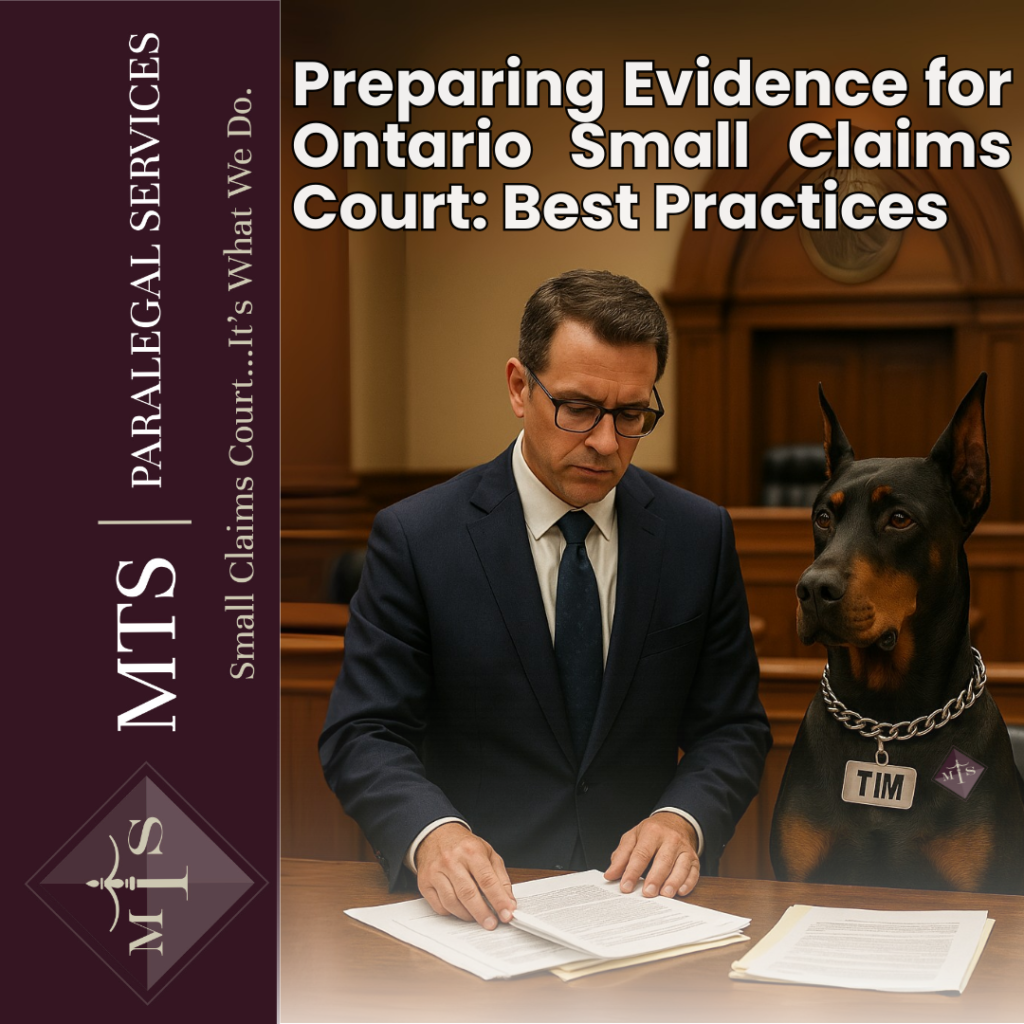
Preparing Evidence for Ontario Small Claims Court: Best Practices
Introduction
Commencing or defending a claim in the Ontario Small Claims Court requires more than the articulation of grievances or the filing of standard forms. The success of any litigant’s case is heavily contingent on the quality, credibility, and admissibility of evidence presented before the court. Proper preparation of evidence is not merely a procedural necessity; it is an indispensable legal strategy that may determine whether the claim succeeds or fails. MTS Paralegal Services, led by Paralegal Timothy Ellis in Kitchener, Ontario, provides professional legal support in this regard, ensuring that evidence is properly structured, compliant with the Rules of the Small Claims Court, and persuasive before a deputy judge.
Understanding the Nature of Evidence
In Canadian legal practice, evidence encompasses any material capable of proving or disproving a fact in dispute. In the Small Claims Court, evidence generally includes written documents, photographs, contracts, invoices, receipts, witness testimony, and expert reports. The Rules of Evidence, while somewhat relaxed compared to the Superior Court of Justice, still require litigants to ensure that their submissions are relevant, material, and not overly prejudicial.
Tim at MTS Paralegal Services routinely emphasises that evidence is not simply about quantity. A single well-prepared contract, corroborated by a contemporaneous email exchange, may carry more probative value than numerous disorganised or duplicative documents. Strategic curation of evidence is therefore essential.
Documentary Evidence
Documentary evidence often forms the backbone of Small Claims Court proceedings. Common examples include written agreements, proof of payment, estimates, or photographs of damaged property. Each document should be authenticated and clearly tied to the issues in dispute. The court expects parties to produce originals wherever possible, or at minimum, certified true copies.
Parties are also required to serve and file their evidence in compliance with court timelines. The obligation to disclose evidence to the opposing party ensures fairness and prevents litigation by surprise. Tim at MTS Paralegal Services advises clients that late submission of evidence may result in exclusion by the court, which can be fatal to a claim or defence.
Witness Testimony
Witnesses remain a critical component of Small Claims Court trials. Lay witnesses may testify regarding facts they observed, while expert witnesses may provide opinions within their professional expertise. To enhance credibility, witnesses should be prepared to testify clearly, truthfully, and without embellishment.
Tim at MTS frequently underscores that witness credibility often outweighs the mere existence of testimony. An honest witness who admits limitations in memory may be considered more persuasive than a witness who exaggerates or appears biased. Parties should ensure that their witnesses are available, punctual, and aware of the solemnity of proceedings.
Photographic and Digital Evidence
In contemporary litigation, photographs, videos, and digital records often play an indispensable role. Images of damaged property, text message conversations, or timestamps from electronic platforms can substantially corroborate a party’s version of events. Such evidence, however, must be authenticated. For instance, the party tendering text messages should be able to explain how the records were preserved and confirm their accuracy.
Tim at MTS Paralegal Services ensures that digital evidence is properly formatted, legible, and printed where necessary to comply with filing requirements. Courts are unlikely to accept evidence that is distorted, unclear, or presented without proper explanation.
Organising Evidence for Trial
The organisation of evidence is a discipline in itself. Small Claims Court matters are expedited, and deputy judges expect parties to present their cases efficiently. Evidence should be compiled in a logical sequence, with an index and tabbed pages where possible. Exhibits must be labelled consistently so that the court, opposing party, and witnesses can refer to them without confusion.
Tim at MTS prepares evidence binders that follow a systematic approach, ensuring that both the judge and opposing counsel can easily navigate the documentation. Disorganisation may create an unfavourable impression and distract from the merits of the claim.
Legal Relevance and Strategy
Beyond preparation, parties must assess the legal relevance of their evidence. A receipt for unrelated purchases, for example, has no probative value and may dilute the strength of the overall case. Strategic evidence selection is thus vital. The Rules of the Small Claims Court confer discretion upon the deputy judge to admit or exclude evidence, and poorly considered submissions may prejudice a litigant’s position.
Tim at MTS Paralegal Services provides clients with legal insight into the admissibility and weight of their evidence, ensuring that only the most compelling materials are advanced. This strategic curation not only saves time but also enhances the persuasiveness of the claim.
Final Advisory
Preparing evidence for Ontario Small Claims Court requires rigorous attention to accuracy, credibility, and legal compliance. Many litigants underestimate the procedural complexity involved in assembling and presenting evidence, often to their detriment. Professional guidance ensures that the evidence is not only admissible but also strategically advantageous.
For individuals or businesses engaged in Small Claims Court matters, contacting Tim at MTS Paralegal Services provides the assurance of professional preparation and representation. Tim’s office, located at 15 Schneider Ave, A2 Kitchener, Ontario N2G 1K7, can be reached at (226) 444-4882 or through the website mtsparalegalservices.com. Small Claims Court—It’s what Tim does.
This content does not constitute legal advice. For up-to-date guidance or legal advice specific to your situation, please contact MTS Paralegal Services Professional Corporation or call (226) 444-4882.
